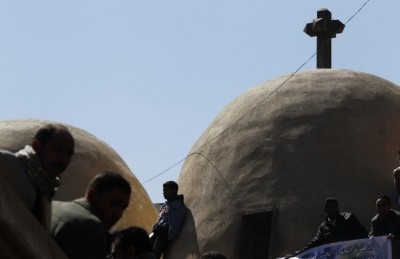Two Children to be Tried for Insulting Islam in Egypt as Anti-Christian Hostility Escalates

Among files on arrested converts from Islam, kidnapped Christian girls and beaten monks piling up on the desk of a noted lawyer in Egypt, on top is the case of two boys about to be tried for allegedly showing contempt of Islam.
Attorney Karam Gabriel said anti-Christian hostilities in the restive country are getting worse as the two boys are to be tried in a court in Beni Suef – the same city where a mother and her seven children were convicted last month for reconverting to Christianity – for showing "contempt to Islamic religion and insulting the Koran."
The accusation against Nabil Naji Rizq and Mina Atallah (identified in some press reports as Mina Nadi Faraj), who were 10 and 9 years old respectively at the time of their arrest in late September, of insulting the Koran made headlines throughout the country after a man saw them playing in rubbish that he claimed included pages from the Koran. Accusing them of tearing pages of Islam's holy book – a later version of the story had them allegedly urinating on it – he filed a report that led to the arrest of the two children. They were released in early October.
Angry protestors from Beni Suef reportedly intimidated Christian residents of the nearby village of Ezbat Marco at that time and prevented them from going to work.
"They are just small children, and they don't really understand what all the fuss is about – they can't even tell the difference between the Koran, the Bible or any other holy book," Gabriel said.
Clearly outraged at recent cases of hostility toward Coptic Christians in the post-Hosni Mubarak era, Gabriel said that since Mohamed Morsi came to power last June, the Christian community is in dire need of protection. Tensions are such that, for the moment, there is no information on the exact date of the two boys' trial, as authorities fear it will exacerbate hostilities in the city.
Beni Suef became a greater flash point last month after a criminal court sentenced Nadia Muhammad Ali and her seven children to 15 years for re-converting to Christianity after having converted to Islam. Leaving Islam is punishable by death in the traditional view of sharia that most Muslim scholars uphold, and sharia is cited as a source of law in Egypt's new constitution approved in a December referendum.
Yusuf Zaki, head of the Coptic Alliance in Egypt, said that he was deeply alarmed by the Beni Suef court's verdict.
"We were sure, especially after the revolution that, our court will respect the right of every human being to choose his or her religion, but apparently the court is relying on the Islamic sharia, and therefore Nadia was sentenced to 15 years in prison," he said.
Ali had married a Muslim, Muhammad Abdel-Wahhab Mustafa, 23 years ago in Sharqiya Province. Her family claims that he pressured her to convert to Islam. Several years after her husband died, Ali in 2004 decided to convert back to Christianity. Her seven children, born as Muslims, reportedly supported her decision and joined her in converting.
Conversion by Muslims is prohibited under Egyptian law, however, and so changing the religion designation on their national ID cards was practically impossible. The prosecution claims that Ali had forged birth certificates in order to receive new IDs for her and her children with the help of a few officials in the Ministry of Interior. The Egyptian newspaper Al-Masry al-Yom reported on Jan. 13 she re-converted in order to obtain an inheritance left by her father, which stipulated she would receive it only if she converted back to Christianity.
After the sentencing on Jan. 14, Ali and her children were imprisoned, along with two clerical employees of the Ministry of Interior who reportedly helped the family change their identity and residence documentation.
While cases such as that of Ali and her children have drawn international attention, many others remain largely hidden local affairs, Gabriel said. Coptic Christians would like to see more pressure put on the Egyptian government to protect religious minorities, and they expect more concrete steps from the United States, he said.
"We just like to be equal citizens in our own country," Gabriel said. "Copts and Muslims need to be equal, it's a simple as that."
Copts would also like to see more international monitoring of elections, as many outrageous violations take place far away from Cairo, he said.
"In some Coptic regions, the ways are blocked on the election day so that the voters would not be able to reach the polling stations," Gabrield said. "Also, the kidnapping of our girls and forced conversion to Islam – all of these crimes must not remain unpunished."
Since the fall of Mubarak in the Jan. 25-Feb. 11, 2011 revolution, Coptic Christians have been subjected to attacks in Qana and Minya (Upper Egypt), Alexandria, Helwan, Dahshour, during a demonstration at the Maspero building in central Cairo and Rafah, among others.
Tens of thousands of Coptic Christians are said to have left Egypt since the revolution, and religious rights advocates say lack of protection as well as pressing economic conditions are a growing threat to the existence of the largest Christian community in the Middle East.




























